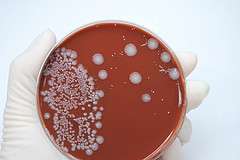Deadly E. coli outbreak in Germany should be a warning, expert says

(Medical Xpress) -- There are important lessons to be learned in the United States from the recent eruption of foodborne illness in Germany -- which has turned out to be the deadliest E. coli outbreak ever -- according to a food-safety expert in Penn State's College of Agricultural Sciences.
More than 3,300 people have been sickened since the outbreak began, including nearly 800 with a serious complication that can lead to kidney failure and death. German health officials finally were able to trace the illness back to bean sprouts grown on a farm in northern Germany, but not before at least 39 people died.
It's a sobering example of how vital it is for health officials to be able to trace food back to its origin on the farm when an outbreak of foodborne illness occurs, said Luke LaBorde, associate professor of food science. LaBorde conducts extension programs that train farmers to use "good agricultural practices" (GAPs) aimed at preventing contamination in products such as sprouts, lettuce, tomatoes and cucumbers.
"The German officials simply were not able to trace the outbreak back quickly enough to determine where it started and what food was involved," he said. "That's why so many people got sick."
"The seeds that producers buy for growing sprouts can be contaminated without any indication that they are unsafe to use," he said. "So they are just going to continue using that seed until someone tells them, 'Hey, that is making people sick.'"
LaBorde said the new federal food-safety law recently adopted in this country contains provisions that will enable scientists and government food-safety agencies to quickly trace foods back to their origins on the farm.
Now, every package or container of produce must include information about where a food product was grown or created. And because contamination can happen in processing, transport and storage, information about those also are logged and preserved, LaBorde pointed out.
In retrospect, he's not surprised that sprouts were determined to be the cause of the German E. coli outbreak. "We've known for a long time that sprouts can be a problem," he said. "The seeds may become contaminated by bacteria in animal manure in the field or during post-harvest storage."
The process used to germinate seeds is ideal for growing pathogens, LaBorde added. "Abundant nutrients are present, along with high levels of moisture -- and the warm temperatures needed for the sprouting process help to ensure survival and growth of bacteria," he said.
"Mishandling of sprouts during production, packing or distribution has rarely been implicated as the source of sprout contamination. However, bacteria already present in the sprouting seed can continue to thrive if proper food-handling techniques are not practiced during harvest, processing and preparation."
In the United States, the seeds usually are pre-treated with concentrated bleach solutions, and wash water that flows through the sprouts is collected and tested for bacteria such as E. coli, LaBorde explained.
"Perhaps that has not been done in Germany," he said. "Increasingly in this country, we are testing irrigation water and wash water for contamination. There typically is a lot more surveillance here."
LaBorde noted that increasing government testing and regulation is controversial in some circles because it adds costs and makes food more expensive, but politics and food safety aren't compatible when people start getting sick due to foodborne illness.
"There was all sorts of hysteria before the new federal food-safety law came out about how small farmers would be unable to come up with new systems to handle the testing and reporting it required -- record keeping was a real concern," he said.
"And so there were some exceptions put into the bill that exempted growers with less than $500,000 in sales who sell direct to consumers or food stores."
But regulation is a moot point in the marketplace, LaBorde contended, because food safety has been pushed onto the buyers. Each buyer -- such as a huge supermarket chain -- has their own standards that they impose on producers, and they are getting tougher and tougher. Small farmers and huge operations alike must abide by them.
"The private companies are way ahead of the government, and many now are requiring a third-party inspection of produce," he said. "There are no politics in the private food industry -- it is the bottom line that drives things.
"The large grocery store companies have simply decided they don't want to deal with multimillion-dollar lawsuits against them involving contaminated foods. So they are requiring suppliers to put into place processes, tests and requirements -- such as produce being GAPs certified -- that guard against pathogens being present in their products."
But LaBorde advises people to be aware that sprouts are just inherently more risky. "Even the Food and Drug Administration has said you can soak sprouts in bleach and still not kill every pathogen," he said.
"You can't reverse contamination, and the way sprouts are grown, if there is even the smallest amount of contamination present, it can multiply greatly and make people sick."
















